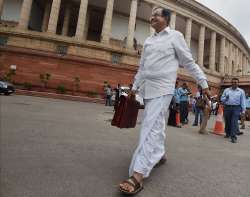We broke promises to Kashmir, should give large degree of autonomy to J&K: P Chidambaram
New Delhi: Former Home Minister P Chidambaram on Wednesday advocated restoring the "grand bargain" under which Kashmir had acceded to India by granting a large degree of autonomy, warning that otherwise the country will have

New Delhi: Former Home Minister P Chidambaram on Wednesday advocated restoring the "grand bargain" under which Kashmir had acceded to India by granting a large degree of autonomy, warning that otherwise the country will have to pay a "heavy price".
"I think their approach is wrong. We have ignored the grand bargain under which Kashmir acceded to India. I think we broke faith, we broke promises and as a result we have paid a heavy price," he told Karan Thapar on India Today.
Senior Congress leader said the best solution, according to him, was that India should give an assurance to the people of Kashmir that the "grand bargain" promised during the time of Kashmir's accession "will be honoured fully".
Chidambaram said, "I may be wrong, I may be right but what is necessary is to give the assurance that the grand bargain will be fully honoured. Let them (people of Kashmir) frame their own laws as much as possible and as long as it does not conflict with the Constitution. We have to assure that we will respect identity, history, culture, religion..."
The Rajya Sabha MP cited India's advice to Sri Lankan on devolution of asymmetric powers to Tamil areas of the north and east and said we should implement what we are preaching to Sri Lanka.
Chidambaram said the situation in Kashmir has been mishandled by successive governments in Srinagar and New Delhi.
"We (UPA government) did mishandle. But we corrected ourselves in 2010. Now, both the governments in Delhi and Srinagar mishandled (it) very, very badly," he said.
Asserting that Kashmir "required a unique political solution", Chidambaram blamed the ruling PDP-BJP alliance for the present crisis saying they (alliance) should have never come to power.
"The alliance itself is a grave provocation for the valley. It is a legitimate government. They have the numbers. The legitimacy of the government has not taken away the fact that these two partners forming government has given a sense of fear among people of Kashmir."
Asserting that 'Azadi' means different things to different people, Chidambaram said what is necessary is to give an assurance that grand bargain will be fully honoured.
"Let them frame their own laws as long as it does not conflict with the Constitution. As much as possible we have to assure that we will respect the identity, history, culture, religion.... and allow them to be part of India."
Asked if Prime Minister Narendra Modi can implement such a proposal as he is known as a doer, he said "I don't know what his fundamentals beliefs are. If his fundamentals belief is that India must be a majoritarian state whatever I said will be a complete waste on him."
He said that the decision of former Chief Minister Mufti Mohammed Sayeed to allign with the BJP was a "blot" on his political career. "It was a serious mistake," he said.
Chidambaram rued that for a long time the Corps Commander of the army was the overall incharge of security of Kashmir and not the Chief Minister or the Director General of Jammu and Kashmir Police.
".. handing over security to defence... making GOC virtually the overall command... these shifts should not have happened.. it happened over the period. I found that GoC was overall incharge not CM or DGP...but CM's writ does not run... We pulled back considerably but there was no follow up," he said.
Chidambaram said when he was Home Minister he wanted to move the army and paramilitary forces to border areas, abolish the controversial AFSPA or at least amend it and make the state police overall incharge of law and order situation.
As many as 10,000 personnel of the forces were moved out. "However, it was not followed up," he said.
Chidambaram admitted that he could not push forward a proposal for withdrawal of AFSPA from parts of the state because of opposition from the defence establishment.
"I could not convince the defence establishment and political leadership. Opinion within the government was sharply divided. Political leadership could not overrule the defence opinion even though paramilitary forces came on board," he said.
He regretted that no follow up action was taken on the reports of the interlocutors for Kashmir appointed when he was the Home Minister.
"I think the interlocutors reports should have been acted upon. We have not implemented bulk of the recommendationm..," he said.
In the latest violence in Kashmir, which was triggred by Hizbul Mujahideen militant commander Burhan Wani, close to 45 people have lost their lives. While thousands have been injured, scores of civilians have been blinded by the pellet guns the security forces use to control the violent crowd.
(With PTI inputs)